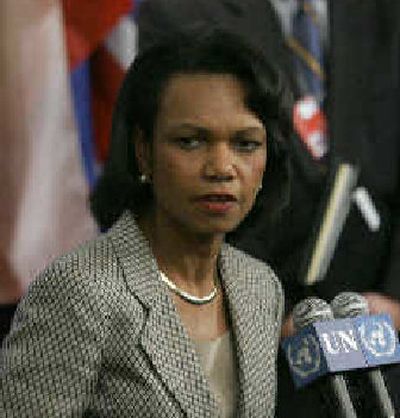U.N. panel warns Syria to cooperate

UNITED NATIONS – A united Security Council warned a defiant Syria on Monday of possible “further action” if it doesn’t cooperate with a U.N. investigation that has implicated top Syrian officials in the assassination of Lebanon’s former prime minister.
But the United States, France and Britain had to drop the explicit threat of sanctions to win unanimous support for the resolution at a rare meeting of the foreign ministers from most of the council’s 15 members.
The three nations stressed they will press for tough U.N. measures if Syria does not comply fully with the probe into the killing of Rafik Hariri and 20 others.
Their original resolution threatening sanctions had to be watered down to get all the council members on board. Russia, China, Brazil and others, particularly Algeria, the only Arab nation on the council, strongly opposed putting sanctions on Syria.
Secretary of State Condoleezza Rice said the resolution still left Syria in a corner.
“With our decision today, we show that Syria has isolated itself from the international community – through its false statements, its support for terrorism, its interference in the affairs of its neighbors, and its destabilizing behavior in the Middle East,” she said. “Now, the Syrian government must make a strategic decision to fundamentally change its behavior.”
The resolution requires Syria to detain anyone considered a suspect by U.N. investigators and let them determine the location and conditions under which the individual is questioned. It also would freeze assets and impose a travel ban on anyone identified as a suspect.
Those provisions could pose a problem for Syrian President Bashar Assad as well as his brother, Maher Assad, and his brother-in-law, Assef Shawkat, the chief of military intelligence. The Syrian leader refused a request from chief investigator Detlev Mehlis to be interviewed, and investigators also want to question his brother and brother-in-law.
Seeking to rally regional support, Assad’s government called Monday for an emergency Arab League summit. But Arab diplomats said it was unlikely that many of the group’s 22 member nations would agree to a meeting, for fear of harming ties with the U.S., Britain and France.
Syrian Foreign Minister Farouk al-Sharaa watched the vote and listened to speeches from all 15 council nations demanding his government fully cooperate. He then lashed out at Mehlis and the council for accusing Syria of committing a crime without producing any evidence.
He said accusing Syrian security forces of having advance knowledge of Hariri’s killing was tantamount to charging that U.S. officials knew ahead of time about the Sept. 11 attacks, Spain knew about the 2004 train bombings and Britain knew about this summer’s London bombings.
The comment visibly angered British Foreign Secretary Jack Straw, who called it “the most grotesque and insensitive comparison,” “appalling,” and “absurd.” Rice noted al-Sharaa was accused of lying in a letter to the Mehlis commission and said his intransigence showed Syria wanted to discredit the U.N. investigation even after a Security Council vote strongly supported it.
Rice was asked whether putting the resolution under Chapter VII would give the United States unilateral authority to use force against Syria, as it did in Iraq.
“This Chapter VII resolution is very explicit in what it means, which is that Syria must cooperate with the Mehlis report and then, if necessary, the council can come back and consider other measures, or other action. … That is what we intend to live by,” she replied.